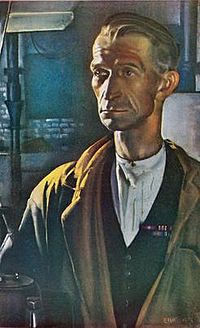James Ockendon facts for kids
Quick facts for kids
James Ockendon
|
|
|---|---|

James Ockendon VC MM painted by Eric Kennington in 1943
|
|
| Born | 10 December 1890 Portsmouth, Hampshire |
| Died | 29 August 1966 (aged 75) Southsea, Hampshire |
| Buried |
Porchester Crematorium
|
| Allegiance | |
| Service/ |
|
| Years of service | 1909–1918 |
| Rank | Company Sergeant Major |
| Unit | The Royal Dublin Fusiliers |
| Battles/wars | World War I |
| Awards |
|
James Ockendon (born December 10, 1890 – died August 29, 1966) was an English soldier. He received the Victoria Cross (VC), which is the highest award for bravery a soldier can get. This special medal is given for amazing courage during a battle. He also earned the Military Medal (MM) and the Belgian Croix de Guerre.
Contents
Early Life and Military Service
James Ockendon was one of nine children. He was born in Landport, a part of Portsmouth. He went to St Agatha's School. After school, he worked for five years at a clothing shop called Chalcraft's.
In 1909, James joined the Royal Dublin Fusiliers as a private. He completed his basic training in Southsea. After that, he served in India for a while.
World War I Experiences
During World War I, James Ockendon fought in Turkey. This was part of the Gallipoli Campaign. On April 24, 1915, he landed on a beach with his army group. He was shot in the forehead during this fight.
After he got better, he served in Egypt. While on leave, he married Caroline Anne in Portsmouth on August 20, 1917. They had four children together. Soon after his marriage, he joined the First Battalion. They were fighting on the Western Front in France.
Award for Bravery
James showed great bravery on September 28, 1917. This was during the start of the Third Battle of Ypres. For his actions, he was given the Military Medal.
Later Life and Recognition
James Ockendon's Victoria Cross award was announced on November 5, 1917. King George V personally presented him with the medal. This special ceremony took place at Buckingham Palace on December 5, 1917.
In April 1918, he received another award. This was the Belgian Croix de Guerre. In the same month, he left the army. He was honorably discharged because of medical reasons.
Life After the War
After World War I, James worked as a crane driver in the dockyard. After retiring from there, he became a school caretaker. Later, he worked at a training center for the Royal Army Ordnance Corps.
During World War II, James Ockendon served again. He joined the Portsmouth Division of the Home Guard. This group helped protect Britain during the war. An artist named Eric Kennington painted his portrait in 1943. This painting was later shown in a book.
James Ockendon passed away at his home in Southsea on August 29, 1966. His funeral was held in Portchester on September 1. His ashes were scattered in the Garden of Remembrance. In 1962, a street was named Ockendon Close in his honor.
Medals and Legacy
James Ockendon received many medals for his service. These include:
- Victoria Cross
- Military Medal
- 1914 Star
- British War Medal
- Victory Medal (with a special mention for bravery)
- Defence Medal (from 1939–45)
- King George VI Coronation Medal (1937)
- Queen Elizabeth II Coronation Medal (1953)
- Croix de Guerre (from Belgium)
His granddaughter still has these medals. They were shown and talked about on the BBC Television show Antiques Roadshow in May 2022.
 | Percy Lavon Julian |
 | Katherine Johnson |
 | George Washington Carver |
 | Annie Easley |

